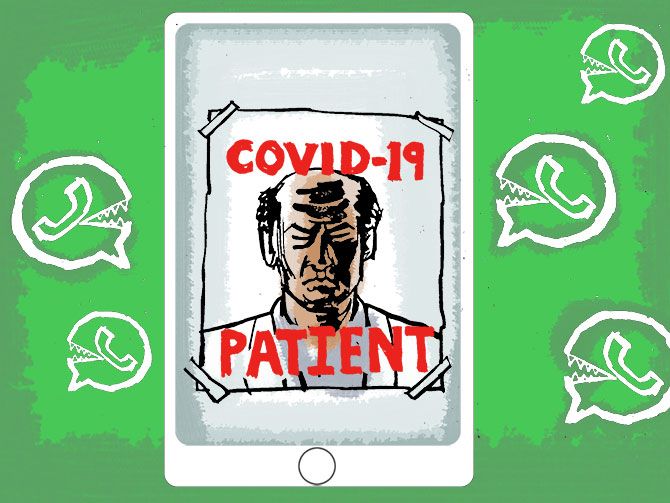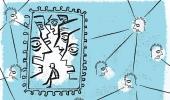When her surgeon-father tested positive for COVID-19, *his daughter did not expect the troubles that followed.
Illustration: Dominic Xavier/Rediff.com

The last few days have been gruelling for my family and for me.
My father, a surgeon, had come in contact with a patient who later tested positive for COVID-19. So my father got tested as well and, late Tuesday night (April 21), we learnt that the result was positive.
It came as a surprise to us as my father had not displayed any of the symptoms.
It was late so we went to bed, not dreaming that we would wake up to a torturous day.
What followed in the next 48 hours was unexpected, beyond belief and exhausting.
After consulting doctors in the morning (on April 22), we decided it would be best to isolate my father in an empty apartment in a nearby building; the building itself was empty because it only housed commercial offices.
We also informed the secretary in our building, so that he could inform the municipal authorities.
In less than an hour, we started getting calls from 'well-wishers' who wanted to 'confirm' what they had heard.
Apparently, a WhatsApp message with my father's name, credentials and address had begun circulating in the locality faster than one would have thought possible.
Since both my parents are doctors, you can imagine the number of people who have their phone numbers.
Of the innumerable calls we received, only a handful actually offered help.
My mother, as you can imagine, was in a dilemma. Should she help my father shift to the isolation apartment and disinfect everything or attend to phone calls?
She is a general physician and has kept her clinic open but has also been answering her patients's health-related queries on the phone since the lockdown.
Repeatedly explaining what had happened was tiring; furthermore, these people expected us to alleviate the panic that had been created by them.
My mother assured them that my father was doing well and there was no need to spread more misinformation.
That day, my mother's phone rang till midnight.
The next day, April 23, we decided to shift my father to a hospital to ensure proper care and to check that his vitals remained good.
We called for an ambulance, which arrived soon after and we went to see him off.
We knew it would be 14 days of the required quarantine before we saw him again, so we wanted to spend every last possible second with him.
Residents in the neighbouring buildings looked down from their windows, as if to enjoy the show that was being put up. I wouldn't be surprised if people took pictures or recorded videos.
Later that day, my mother received a warning message from a colleague; a rumour was being circulated that my mother too had tested positive.
We were exasperated!
To top it off, our building was sealed and a neighbour who had volunteered to help us buy groceries was being bullied by the society members.
In between the dozen phone calls and messages we received from those who were genuinely concerned, we faced an avalanche of people spreading misinformation and behaving as if we had caused the end of the world.
We were being unfairly called out and victimised.
We were facing social discrimination because my father, a surgeon, was infected with the coronavirus in the course of doing his duty.
In the process, this is what I have learnt.
While informing the secretary of the building, as is their duty, the family members of a person who has tested positive for COVID-19 should also request that the information not be spread beyond the building.
The protocol outlined by the municipal corporation must be strictly followed.
Also, I would suggest that you follow up with the municipal corporation if they haven’t taken the proper course of action.
A word of advice to everyone else. If you hear that someone who has tested positive for COVID-19, please do not call their family/relatives for details.
Do not circulate such messages in your various groups.
Do not spread misinformation.
Put yourself in the patient's family';s shoes -- they are facing a lot of difficulties and are emotionally vulnerable as well.
If you want to help in any way, just send them a message.
If you cannot do any of the above, at least don’t forward messages that will create panic.
*The writer has chosen to remain anonymous.











 © 2025
© 2025